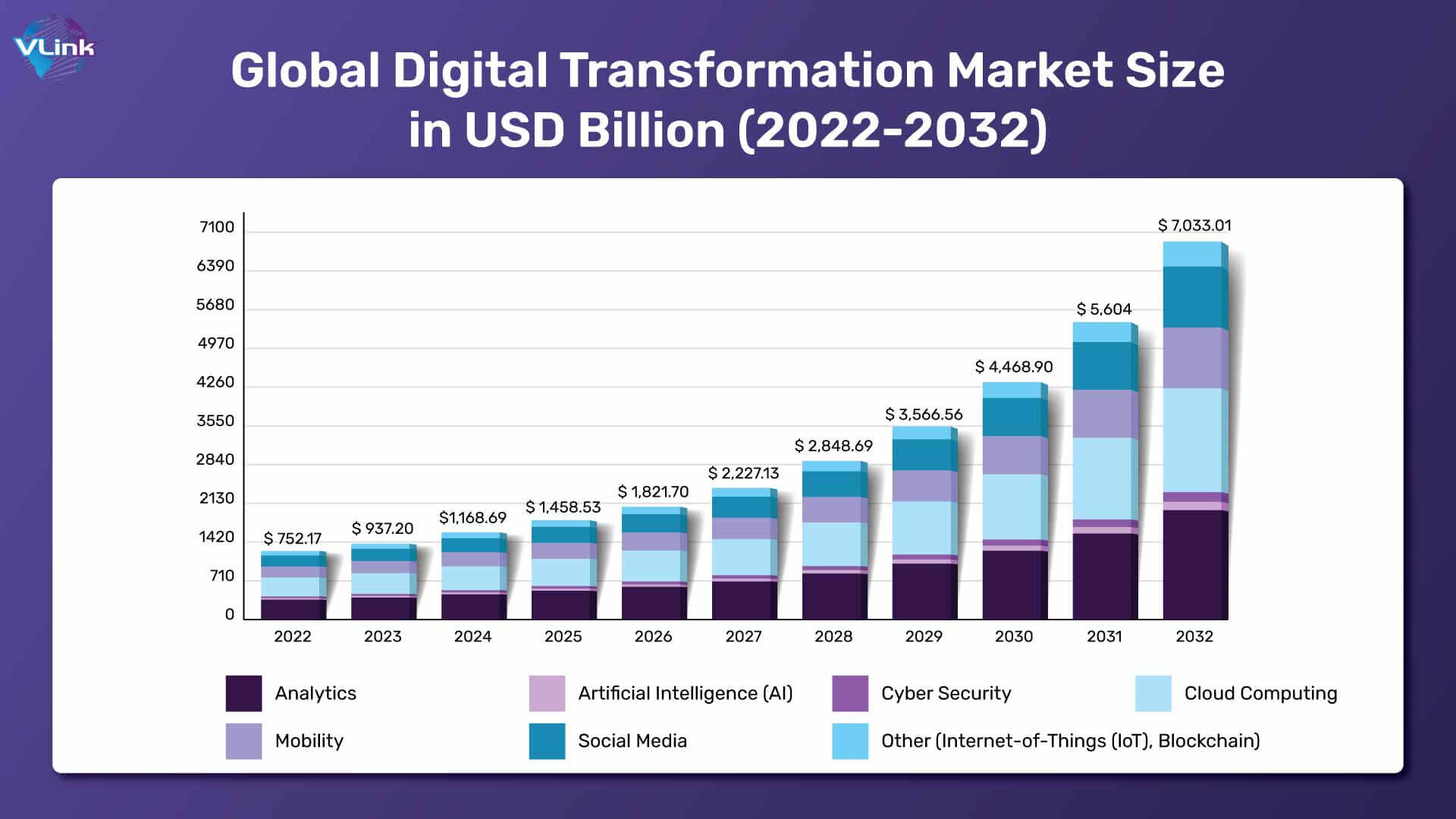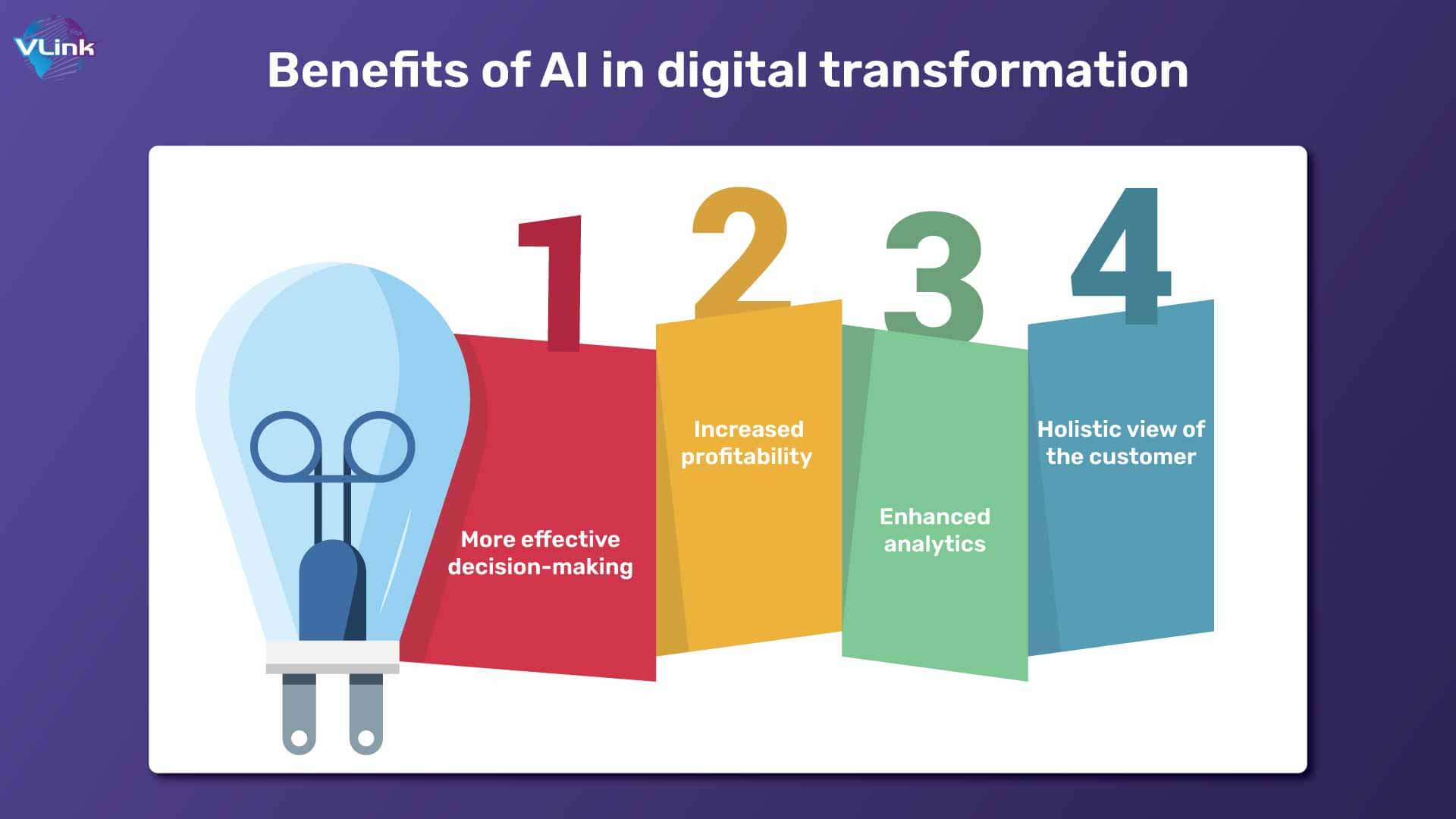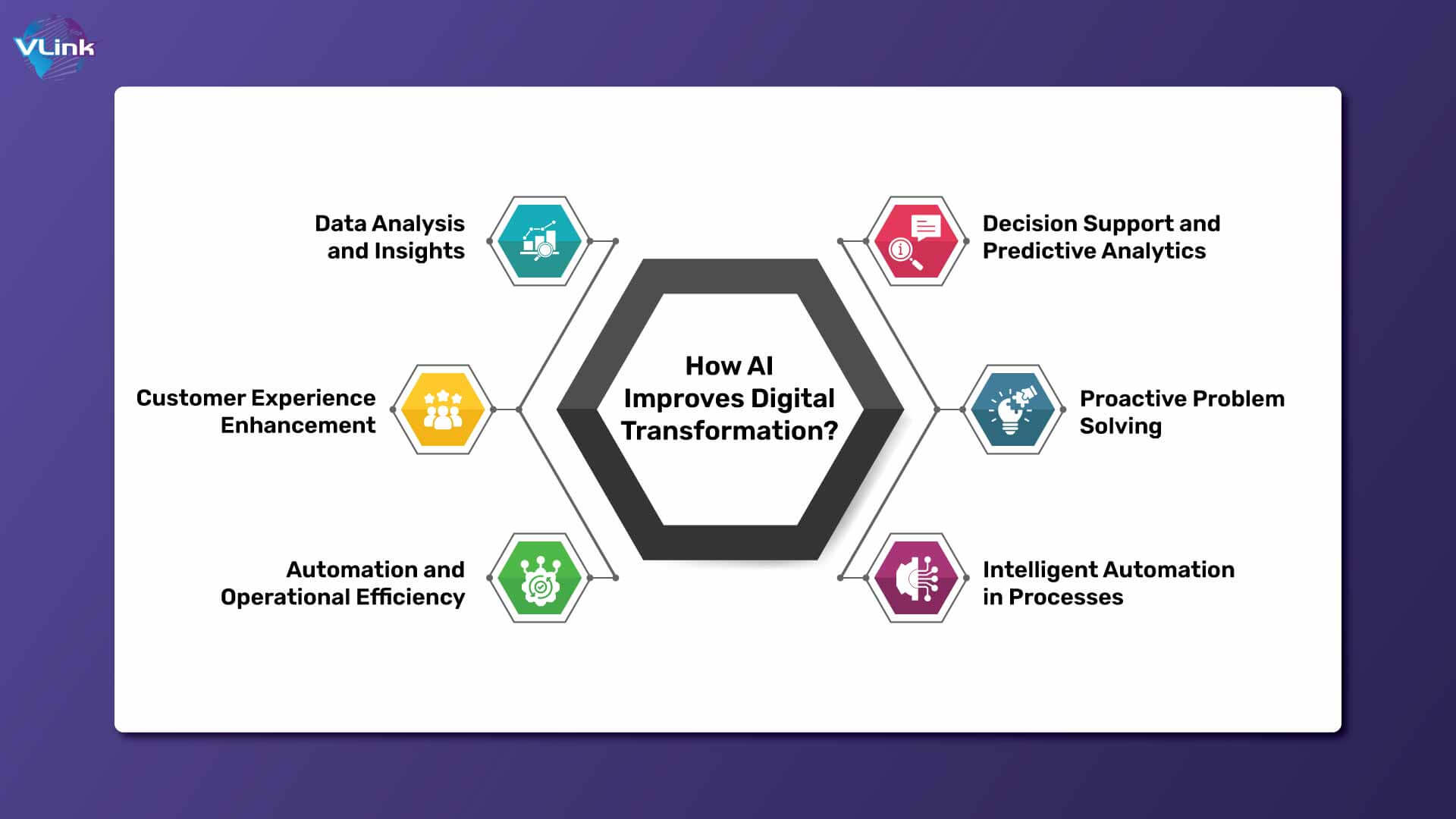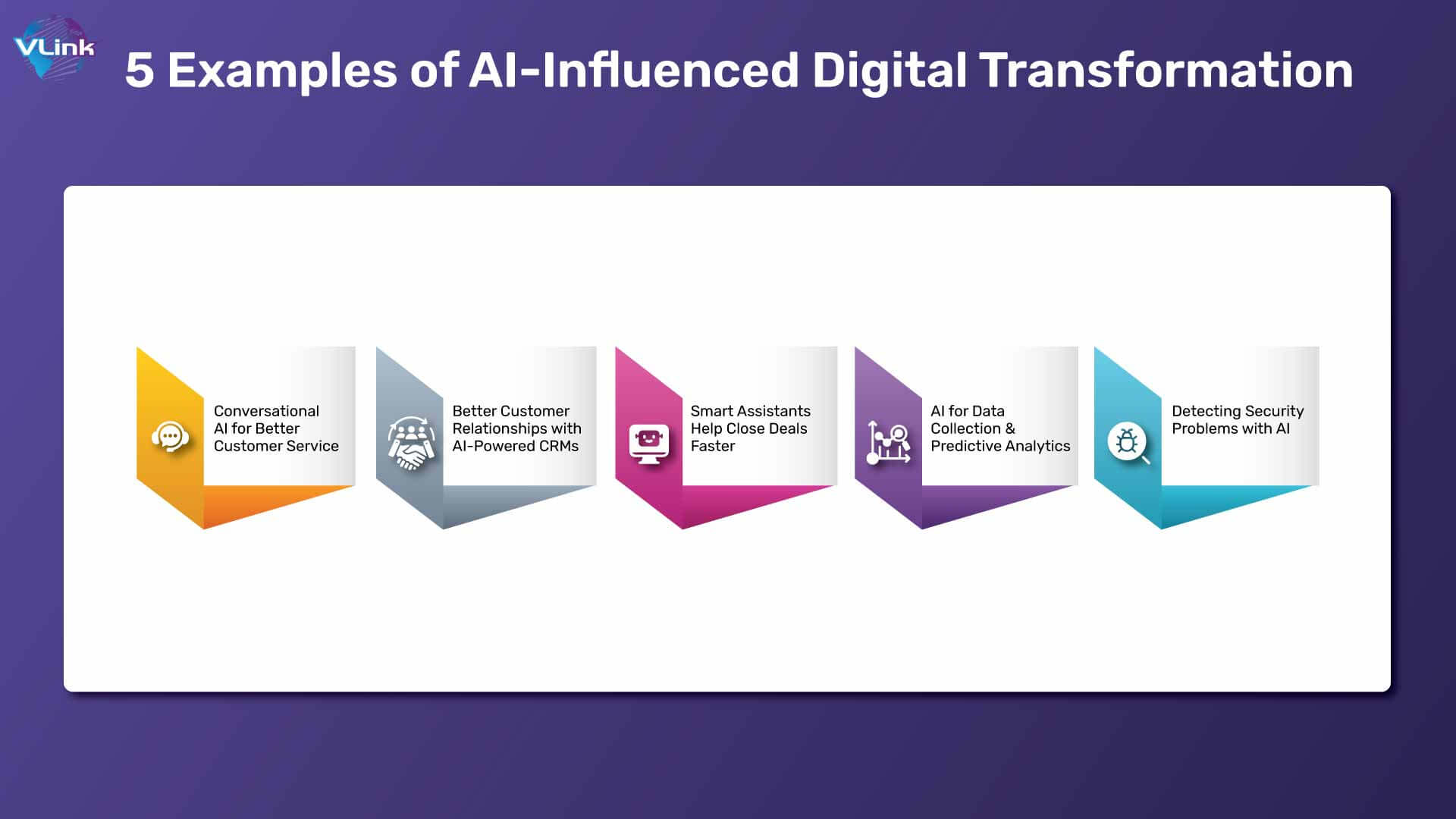In the evolving business environment, Artificial Intelligence (AI) in Digital Transformation have emerged as crucial components that are reshaping the landscape. The Global digital transformation market size, technologies is shown in below image:

Organizations, driven by technological advancements, are increasingly seeking to harness the power of AI to enhance operational efficiency, extract valuable insights from data, and deliver exceptional services to their customers
This coordination between AI and business processes has fueled a change in thinking, allowing businesses to redefine their operational strategies, customer interactions, and value propositions, heralding a new era in digital transformation.
The intersection of AI and digital transformation presents a wealth of possibilities, spanning from streamlined operations and increased productivity to elevated customer experiences and inventive business models. Yet, the integration of AI comes with its set of difficulties.
Successful implementation requires a thorough comprehension of both AI and digital transformation, a well-defined vision, and a strategic approach to seamlessly incorporate AI in digital transformation. This transformation entails overcoming a learning curve and addressing ethical considerations while continually adapting to the ever-changing technological landscape.
Let's delve into the intricacies of this subject and elucidate how AI serves as a catalyst in the digital transformation journey of businesses.
What is AI in Digital Transformation?
Rather than machines replicating human thought processes, AI involves sophisticated algorithms tailored for specific tasks with well-defined inputs. For instance, AI in digital transformation operates within predefined parameters and doesn't exhibit independent "thought."
Unlike traditional automation, AI-powered processes excel at adapting to new information and unexpected changes. The essential advantage lies in their ability to learn from both success and failure, enabling self-correction and proactive analysis of data to anticipate challenges.
Contrasting with standard automation, which thrives in established processes, AI is most effective in tackling complex challenges or situations not bound by preset rules. When given a set of inputs, AI can analyze the data and propose or automatically execute the optimal course of action, depending on the context.
What are the Benefits of AI in digital transformation?

More effective decision-making
Contrary to depictions in many films and shows, critical decisions should not solely rely on intuition. Even experienced leaders require access to comprehensive data to arrive at optimal conclusions. Time constraints often necessitate swift decision-making.
Artificial Intelligence in digital transformation plays a crucial role in identifying and highlighting pertinent information related to product performance, workflow optimization, and predictive outcomes.
A well-defined program can execute millions of simulations, providing a rough estimate of how a new product is likely to perform in its initial six months based on available data.
Armed with such information, decision-makers can more effectively assess remaining tasks, pinpoint potential challenges, and make accurate predictions regarding the time and resources required to progress.
Increased profitability
While AI doesn't replace human judgment, it proves to be a highly efficient tool for optimizing time-to-value. Manufacturers continually grapple with the challenge of consistently delivering compliant products within increasingly tight deadlines.
AI in digital transformation plays a pivotal role in streamlining product timelines by preemptively identifying issues, conducting simulations, and cross-referencing against proprietary data.
By automating time-consuming tasks, AI software liberates human resources to focus on the more cognitive aspects of product and mobile app development. It not only enhances efficiency but also reduces resource requirements, leading to improved profit margins.
Enhanced analytics
Data sets, often vast and intricate, originate from diverse sources and geographic locations. Historically, compiling, processing, and analyzing such data demanded significant time and personnel resources.
While humans remain integral to the final analysis, AI in digital transformation significantly expedites every facet of this process, providing data results in a fraction of the time. Particularly for large manufacturers with extensive assets globally, AI emerges as a crucial element in delivering actionable insights promptly.
A holistic view of the customer
The foundation of the digital world is shaped by data, with its nature and sources constantly evolving. Traditionally, tools like cookies served to provide organizations with insights into consumer behavior. However, due to mounting privacy concerns and other considerations, there has been a significant decrease in the use of cookies.
Consequently, companies must seek alternative tools to gain a deeper understanding of their customers' behaviors. AI-enhanced software enables decision-makers to potentially garner an improved understanding of their customers compared to what cookies could achieve.
How AI Improves Digital Transformation?

Data Analysis and Insights
AI in digital transformation processes and analyzes vast amounts of data quickly and accurately. Machine learning algorithms and data analytics services can identify patterns, trends, and correlations in data that might be challenging for traditional analytics tools.
This capability provides organizations with deeper insights into their operations, customer behavior, and market trends, enabling more informed decision-making.
Customer Experience Enhancement
AI-powered tools, such as chatbots and virtual assistants, significantly improve customer interactions. Natural Language Processing (NLP) allows these systems to understand and respond to human language, enhancing the overall customer experience.
Personalized recommendation engines powered by AI in digital transformation contribute to customer satisfaction by delivering relevant content and services tailored to individual preferences.
Automation and Operational Efficiency
AI-driven automation goes beyond traditional rule-based processes. Machine learning algorithms enable automation systems to adapt and learn from experience, making them more flexible and efficient. It enhances operational workflows, reduces manual efforts, and allows organizations to achieve higher levels of efficiency in their processes.
Decision Support and Predictive Analytics
The role of AI in digital transformation facilitates better decision-making through advanced analytics and predictive modeling. By analyzing historical data and identifying patterns, AI systems can assist in forecasting, risk management, and strategic planning. It empowers decision-makers with valuable insights, helping them make informed choices that align with organizational goals.
Proactive Problem Solving
Unlike traditional systems that operate based on predefined rules, AI systems can be proactive. They continuously analyze data in real-time, allowing organizations to anticipate challenges and opportunities. This proactive approach enhances business resilience, enabling organizations to address issues before they become critical and swiftly adapt to changing circumstances.
Intelligent Automation in Processes
The role of AI in digital transformation enhances automation by introducing intelligence into routine processes. It includes automating complex decision-making tasks and adapting to changing conditions. Intelligent automation not only accelerates processes but also improves accuracy and reduces errors, leading to more reliable and efficient operations.
What is the Future of AI in Digital Transformation?
The future of AI in digital transformation holds immense promise. AI will increasingly drive automation, efficiency, and innovation across industries. Enhanced data analytics, predictive capabilities, and personalized user experiences will redefine business processes. AI's integration into decision-making processes and its ability to adapt swiftly to evolving trends will be pivotal.
Collaboration between humans and AI will be emphasized, optimizing productivity. Ethical considerations and robust security measures will be imperative. Overall, AI is set to be a transformative force, propelling organizations toward a more intelligent, adaptive, and technologically advanced future.
Also Learn: Ai and ml will revolutionize the future of digital transformation.
5 Examples of AI-Influenced Digital Transformation

Conversational AI has evolved from basic chatbots to advanced virtual customer assistants. A straightforward FAQ bot addresses common queries by users entering keywords, leveraging machine learning to provide relevant responses.
AI personal assistant app development like Amazon's Alexa, Apple's Siri, and Google Assistant handle intricate, customized questions and assist users in executing tasks or making orders.
Highly sophisticated virtual assistants, exemplified by Microsoft Power Virtual Agents, grasp contextual details, such as issue and customer type, intelligently directing incoming requests to specific bots.
AI in digital transformation equips sales teams with a comprehensive customer overview, amalgamating data from sources like web searches, order history, and product reviews. This insight aids in understanding customer needs, improving engagement, and automating routine CRM tasks.
They were leading CRM software like Zoho, Salesforce integration solution, Sugar CRM, and Siebel, leveraging AI to process customer input and provide intelligent brand recommendations.
Amazon's AI recommendation engine tailors its approach for diverse personality sets, with ASOS accurately predicting customer lifetime spending and OTTO using ML-trained algorithms for precise stock management and 90% accurate predictions of upcoming purchases over the next month.
Advanced sales assistant software, exemplified by Google's Nespresso Assistant, anticipates shoppers' preferences through a three-step process:
Intelligent assistants pose focused questions to help buyers pinpoint their desires or requirements.
AI-driven systems employ algorithms to identify and present buyers with suitable products.
The intelligent system assists buyers in completing sales.
The allure of AI-guided sales lies in its low-touch model, converting leads with minimal human involvement. Predicted to be adopted by 60% of sophisticated companies by 2025, this approach stands as the fastest-growing trend in contemporary sales.
Imagine having insights into your company's future to avoid pitfalls and automate behaviors for increased profitability proactively.
AI, utilizing machine learning, achieves this through tools like SAS Advanced Analytics. This software analyzes business data, identifying the most appealing products and marketing strategies while uncovering areas for improvement. Integrated features include:
- Anomaly detection, pinpointing ineffective marketing strategies, and eliminating features that deter potential customers.
- Sentiment analysis, gauging social media opinions about your brand for product enhancement.
- Predictive analytics for fraud detection, attrition, turnover, and retention projections.
This intelligent software empowers businesses to make informed decisions, fostering growth and mitigating risks.
Businesses employ machine learning and AI development services to enhance both physical security and cybersecurity, safeguarding intellectual property. Examples include:
- Security Screening
- Security & Crime Prevention
- Endpoint Protection
- Sophisticated Cyber Protection
Transform Your Business Digitally with VLink!
We are a digital transformation services company that helps businesses achieve tangible results and establish agile processes by offering custom-made solutions based on the evaluation of their current capabilities.
Our dedicated development team is prepared to expedite comprehensive business growth by leveraging cutting-edge technologies that provide dependable and scalable solutions.
Here are some ways how can we help you in transforming your business digitally
- Implement digital transformation comprehensively, rapidly, and at scale.
- Create new revenue streams for your business
- Cut costs and risks with informed decision-making
- Redefine how you engage with the existing and prospective clientele
- Enhance responsiveness and adaptability to market trends.
- Embrace and excel in the newest and emerging technologies for your business.
Frequently Asked Questions
AI is pivotal to digital transformation by automating tasks, analyzing vast datasets for actionable insights, and enhancing decision-making processes. It streamlines operations, improves efficiency, and enables businesses to adapt rapidly to evolving challenges. AI is a catalyst for innovation, driving transformative changes across industries in the digital era.
AI plays a fundamental role in digital transformation by automating processes, analyzing data for insights, and enabling informed decision-making. It enhances efficiency, innovation, and adaptability, driving transformative changes across industries. AI reshapes business models and processes to thrive in the rapidly evolving digital landscape.
AI and digital transformation are intricately connected as AI technologies serve as catalysts for digital innovation. AI powers automation, data analysis, and intelligent decision-making, critical elements of digital transformation.
The connection between AI and digital transformation results in enhanced efficiency, improved customer experiences, and the ability to navigate and capitalize on the evolving digital landscape for sustained business success.








